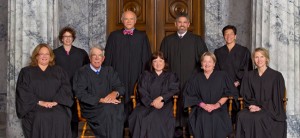This spring there has been a surge of tribal public opinion against the practice of tribal disenrollment. The tide of tribal public opinion is dramatically turning on that non-indigenous mode of Indian self-termination, and those tribes and tribal leaders who extinguish their kin. Most recently, Marty Two Bulls drew and pubished this political cartoon:
RED ALERT: Congress Foretells Return to Termination
Five years ago, Drs. Stephen Cornell and Joseph Kalt cited a Republican-fueled “trend away from the Indian self-government movement” and predicted that a GOP-controlled Congress might well put “an end to policies of self-determination.” That possibility could not be more real that it is today.
Gabe Galanda to Urge “Finding a Cure for Tribal Disenrollment” in Phoenix
Gabe Galanda will advocate for “Finding a Cure for Tribal Disenrollment,” at the Annual Meeting of the Native American Bar Association-Arizona in Phoenix on June 26. Gabe will speak from the Arizona Law Review article that he recently published with Ryan Dreveskracht. SeeNABA Annual Meeting Flyer.
Gabriel S. Galanda and Amber Penn-Roco practice Indian law with Galanda Broadman, PLLC, in Seattle. Gabe is an enrolled citizen of the Round Valley Indian Tribes, and Amber is an enrolled member of the Confederated Tribes of the Chehalis Reservation.
Ryan Dreveskracht to Advocate for "Finding a Cure for Tribal Disenrollment"
Ryan Dreveskracht will advocate for "Finding a Cure for Tribal Disenrollment," at the 27th Annual WSBA Indian Law Seminar in Seattle on June 11. Ryan will speak from the Arizona Law Review article that he recently published with Gabe Galanda.
Ryan Dreveskracht is an Associate at Galanda Broadman, PLLC. His practice focuses on representing tribal governments in public affairs, energy, gaming, taxation, and general economic development. He can be reached at 206.909.3842 or ryan@galandabroadman.com.
Galanda, Dreveskracht's Disenrollment Scholarship Dubbed "A Must Read For All Of Indian Country"
Tucson, AZ (May 11, 2015) - The editors of Arizona Law Review are pleased to announce the publication of Issue 57:1 which features the article "Curing the Tribal Disenrollment Epidemic: In Search of a Remedy" by Gabriel S. Galanda and Ryan D. Dreveskracht.
The article provides a comprehensive analysis of tribal membership, and the divestment thereof— commonly known as “disenrollment.” Chiefly caused by the proliferation of Indian gaming revenue distributions to tribal members over the last 25 years, the rate of tribal disenrollment has spiked to epidemic proportions and is without a remedy.
The article, using historic and contemporary case studies, details the federal government’s role in promoting disenrollment and describes how disenrollment operates in ways that are antithetical to tribal sovereignty and self- determination. In concludes with potential solutions to cure the tribal disenrollment epidemic.
“This article is the most important, and most thoroughly researched and argued treatment of the tribal disenrollment available in literature,” says Professor Robert A. Williams, Jr., Co-Chair of the Indigenous Peoples Law and Policy Program at the University of Arizona. He adds, “It is a must read for all of Indian country.”
Galanda is a 2000 graduate of the University of Arizona James E. Rogers College of Law, and is an enrolled member of the Round Valley Indian Tribes. He is a founding partner of the law firm Galanda Broadman, PLLC, in Seattle; his firm represents tribal governments, businesses and members in all varieties of dispute resolution and business matters.
Galanda's practice focuses on complex, multi-party litigation and crisis management, representing tribal governments and businesses. As an emerging leader in the legal profession, he was named to the Puget Sound Business Journal’s “40 Under 40” and the National Center for American Indian Enterprise Development’s “Native American 40 Under 40” lists.
Galanda also serves on the Native Nations Institute for Leadership, Management and Policy’s International Advisory Council. Galanda recently served as the Indigenous Peoples Law and Policy Program Distinguished Practitioner in Residence, lecturing on issues such as disenrollment and working with students.
Co-author Ryan D. Dreveskracht is a 2009 graduate of the University of Arizona James E. Rogers College of Law. At Galanda Broadman, PLLC, his practice focuses on representing businesses and tribal governments in public affairs, gaming, taxation, and energy development.
Dreveskracht writes prolifically about matters critical to Indian country, and has published in numerous peer-reviewed journals and law reviews. In 2013, he was named a “Rising Star” by the Super Lawyers rating service and Seattle Met Magazine.
Arizona Law Review is a student-edited journal that publishes four issues annually. "Curing the Tribal Disenrollment Epidemic: In Search of a Remedy" and archival issues can be viewed at www.arizonalawreview.org.
Gabe Galanda, Amber Penn-Roco Publish Article Decrying State v. Shale
Gabe Galanda and Amber-Penn Roco have published an article in the May edition of King County's Bar Bulletin--themed "Moving"--regarding the Washington State Supreme Court's recent decision in State v. Shale.

The piece is titled "State v Shale - Supreme Court Moves Washington in the Wrong Tribal Direction." An excerpt:
Congress understands that tribes want to eradicate sex offenders, wife beaters and other criminals from their homelands, and the U.S. Supreme Court has affirmed tribal jurisdiction to do so. More importantly, the Washington State Legislature and Governor share that understanding, or they would not have trusted tribes, like the Yakama Nation, to reassume authority over their lands upon the State’s retrocession therefrom. . . .
To be sure, deterring crime throughout Washington State, and empowering tribal justice systems, are not mutually exclusive state policies. In fact, the 29 tribal sovereigns in our State aspire to exactly both of those goals.
In all, it is now time for the Washington State Supreme Court to move in a common direction with other lawmakers and sovereigns in our State—towards the restoration of tribal criminal authority over bad actors on Indian lands.
Gabriel S. Galanda and Amber Penn-Roco practice Indian law with Galanda Broadman, PLLC, in Seattle. Gabe is an enrolled citizen of the Round Valley Indian Tribes, and Amber is an enrolled member of the Confederated Tribes of the Chehalis Reservation.
Ryan Dreveskracht Publishes Law Review Article Assailing the MSA
Ryan Dreveskracht has published, "Forfeiting Federalism: The Faustian Pact With Big Tobacco," in the Richmond Journal of Law and The Public Interest, which assails the Master Settlement Agreement (MSA) between the states and Big Tobacco as bad for both state business and tribal sovereignty. Only Big Tobacco has won.

In sum, it appears that state attorneys generals’ encroachment upon state legislatures’ policy-making, effectively binding each state into a deal with the major tobacco companies, resulted in a benefit only to “Big Tobacco” companies and not the states. In addition, tribal governments have suffered the brunt of the abuse in that states and the federal government have effectively been forced to attack tribal sovereignty at the behest of these major tobacco companies. In the modern era of states’ rights, from a purely legal perspective “it is simple enough for many states and local governments — as well most federalism commentators — to ignore Indian nations.”
Ryan Dreveskracht is an Associate at Galanda Broadman, PLLC. His practice focuses on representing tribal governments in public affairs, energy, gaming, taxation, and general economic development. He can be reached at 206.909.3842 or ryan@galandabroadman.com.
Ryan Dreveskracht to Discuss Tribal Banishment on Native American Calling
Ryan Dreveskracht will appear on Native American Calling this Tuesday at 10 AM Pacific, along with Professor Matthew Fletcher, to help ask and answer: "Banishment: Good or Bad for Tribal Communities?"

Tribal banishment can be seen as an expression of justice, restoring balance, or righting a wrong. Banishment can be permanent or temporary. It can strip a tribal member of their enrollment status and it can happen for a variety of reasons – from embezzling to murder to selling drugs. It’s a tribal tradition that remains in effect in some communities today, but how effective is it and what are the downsides? Is banishment a form of tribal justice? Or the appropriation of a tradition for modern, possibly less-honorable, needs?
In a forthcoming Arizona Law Review article, tentatively titled, “Curing the Tribal Disenrollment Epidemic: In Search of a Remedy,” Ryan and Gabe Galanda address banishment, as distinct from disenrollment and other modern tribal exclusionary practices. An excerpt:
Similar to the citizenship rules implemented by the United States and most other countries today, the right of belonging or kinship has historically been permanent and could not be lost involuntarily. Quite simply, in traditional American indigenous society the casting out of one’s own relatives did not occur.
The exception to this rule was “banishment,” a punitive sentence under which an indigenous person was sent out of his or her community, and forced to live away from the community for a prescribed period of time. In most American indigenous societies, individuals were held accountable for their transgressions by being forced to restore stability and harmony within the family and tribal community by compensation and seeking forgiveness. An individual’s delinquent behavior was thus of concern to both his or her own family, as well as the local community. An individual’s kin would impose an initial reprimand; the community could impose further sanctions, and might also admonish the kin if the original discipline was not appropriate. Banishment of the individual was only considered as a last resort, if familial and community penal efforts failed, and reserved for serious crimes, such as murder or incest. In order to effect banishment as a punishment, a consensus of the community was generally required; such consensus was most often established through the presentation of oral testimony about an individual’s character and wrongdoing to a tribal governing body, if not the entire community. Yet given indigenous notions of belonging, even a banished person was typically allowed to return to the community conditionally after serving his or her time away.
In short, unlike banishment, disenrollment is not a traditional practice of American indigenous peoples. While banishment has a natural place in tribal society, disenrollment simply does not.
Ryan Dreveskracht is an Associate at Galanda Broadman, PLLC. His practice focuses on representing tribal governments in public affairs, energy, gaming, taxation, and general economic development. He can be reached at 206.909.3842 or ryan@galandabroadman.com.








